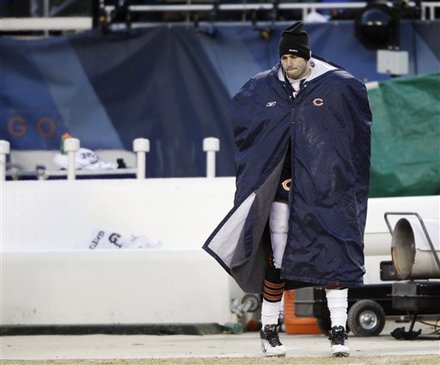I’ve thought it interesting the relative lack of major social media stories to come from the sports world relative to politics, music, academia and other significant public institutions. However, this past Sunday an explosion of Twitter activity was directed at Chicago Bears quarterback Jason Cutler, creating a prime example of how the Twitterverse can change the way people consume sports. And perhaps even how the game is played.
The story begins with Cutler sitting on the sidelines, injured, watching his team lose a game against the long-time rival Green Bay Packers that would have sent his Bears to the Super Bowl. During the loss, Twitter exploded with calls for Cutler to get back in the game. Some of the most prominent criticisms came from NFL players. The rise of social media means that the story -that Cutler didn’t have the heart to rise above the injury- was already being written before the game was over. After his team lost, he was immediately questioned by the Twitter-connected media. With tears in his eyes, Cutler delivered no comment.
This is arguably one of the biggest intrusions of social media into the highly-guarded and secretive arena of professional sports. Today, more and more people, as well as players whose teams had not made it this far, are using Twitter to contribute to a stream of thoughts about the game being played in real-time (note: players are not allowed to Tweet during games in which they are playing). Professional sports are never an activity put on by the few that we passively watch, but increasingly an experience actively created by the many.
This has caused some sports writers to question social media in general:
The twirling twitter feeds of Sunday afternoon changed the story dramatically. You can lament that in our instant gratification world things like facts, perspective and patience have died. That’s true. [Unprecedented social media attack dooms Cutler]
 What is potentially most interesting about this story is that it took so long for this to happen on this scale for the NFL in particular and professional sports in general. Welcome to the ranks of other major institutions like academia, politics, journalism, arts, entertainment and so on in dealing with the potentially disruptive new realities of the instantaneous mass communication of social media.
What is potentially most interesting about this story is that it took so long for this to happen on this scale for the NFL in particular and professional sports in general. Welcome to the ranks of other major institutions like academia, politics, journalism, arts, entertainment and so on in dealing with the potentially disruptive new realities of the instantaneous mass communication of social media.
[note: admittedly, I do not follow professional sports closely. Are there previous major social media sports stories that I have missed? Do post those in the comments.]


Comments 3
margaretaustinsmith — January 27, 2011
Nice work, Nathan! This is pretty different, but another Twitter/sports story that could be of interest as Twitter definitely played a role in one of the most recent great humiliations of UNC football: Marvin "AnchormanAustin" Austin tweeted details (and photo evidence) of NCAA ethical infractions last summer and got himself suspended from the team (and Greg Little as well), and Austin's position coach was fired. Austin's Twitter account got more attention than UNC's actual game of football this past season. http://blogs.newsobserver.com/accnow/austins-twitter-account-provides-clues-in-ncaa-probe-at-unc
and http://www.thewizofodds.com/the_wiz_of_odds/2010/07/a-look-at-marvin-austins-twitter-account.html
nathanjurgenson — January 27, 2011
also, just to note, the Favre text-scandal might qualify depending on if one views texting as social media. but i am really thinking of Facebook, Twitter, etc...